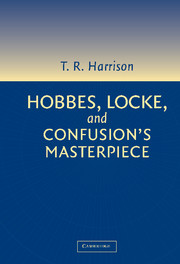 Hobbes, Locke, and Confusion's Masterpiece
Hobbes, Locke, and Confusion's Masterpiece 4 - Hobbes: The Birth of Justice
Published online by Cambridge University Press: 05 June 2012
Summary
Whether our thought is based on the word of God or on natural reason, Hobbes wants to show that we have nothing to do but obey, no other place to go than to submit ourselves to the authorities. Respect, but do not criticise, Leviathan. The greatest threat, in Hobbes's age, to such uncritical respect was religion; hence Hobbes wants to show that there is no religious way round this truth. However, it is exactly the same for him with more secular bases of thought. Here also there is for Hobbes no alternative to political authority. We might try to appeal to the Bible, to the precept that we should obey God rather than man. Or, alternatively, we might try to appeal to our natural reason with its understanding of the objective truths of justice, supposed to be accessible to everyone's individual conscience. Either way, we might think that in so doing we could reach to something beyond the present local authority, something that would justify resistance or rebellion if that authority is found to be wicked, irreligious, or unjust as measured by these independent standards. However, what Hobbes wants to show is that this is not so. There are no such independently accessible standards. Of course there is natural law. Of course there are the truths of justice. Of course there is God commanding right action.
- Type
- Chapter
- Information
- Hobbes, Locke, and Confusion's MasterpieceAn Examination of Seventeenth-Century Political Philosophy, pp. 101 - 131Publisher: Cambridge University PressPrint publication year: 2002


